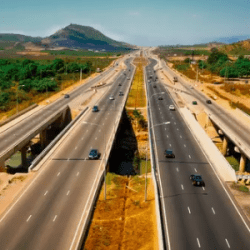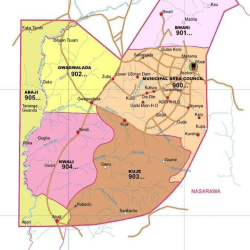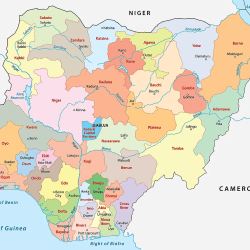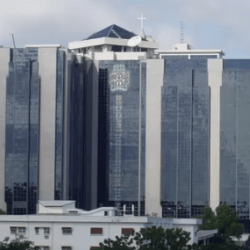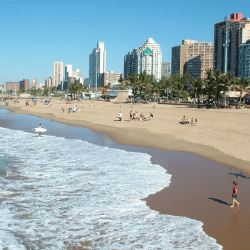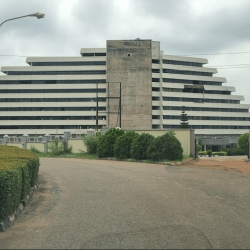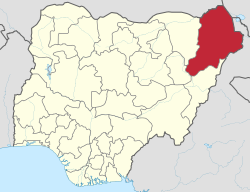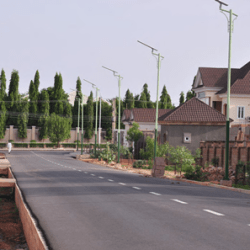Abuja, Nigeria’s capital, is a purpose built city. It was built to serve as the country’s capital.

Abuja was initially a sparsely populated rural area
At the inception of the city, the village was a sparsely populated area; which was one of the reasons for the choice of site.

Abuja was chosen to replace Lagos as Nigeria’s capital due to some shortcomings of Lagos
Nigeria’s capital, Abuja, was also ideally chosen with a view to avoiding the hot and humid lagoon in the south.

The name of a nearby village, known as Abuja, was taken and given to the capital city
Abuja was named after a nearby village in neighbouring Niger State. The village was later renamed as Suleija. Suleija later grew to become a town.

FCDA partnered international planning consultants for a 286 page Abuja Master Plan
In June 1977, the FCDA commissioned a team of international planning consultants, the US-based IPA Group, to prepare a draft Master Plan for the new Federal Capital of Nigeria. And a little more than 18 months later, the 286 page Master Plan was published. The Master plan envisaged Abuja being built in the Northern quadrant of the FCT, which functioned as a cordon sanitarium and as an agricultural hinterland.
The acceptance of the committee’s recommendation led to the enactment of Decree No. 6, of 1976 leading to the establishment of a new Federal Capital.

The capital, Abuja, which was to be a symbol of Nigeria’s aspirations for unity and greatness was excised from Niger, Kwara (know Kogi) and Plateau (now Nasarawa) states.

It has a total land area of 8,000 square kilometers, which is more than twice the land area of Lagos state.
At the conception of the Federal Capital and subsequently the Master Plan was based on the promise that all the approximately 500, 000 inhabitants within the entire 8, 000 square kilometers would be resettled outside the territory.

The University of Ibadan Consultancy Services was commissioned to undertake an ecological survey to ascertain the exact number of people to be settled outside the territory and also to determine the amount to be paid to the affected inhabitants as compensation by the Federal Government.

This policy of total evacuation however, changed in 1978 based on the argument that the funds required as compensation entitlement at over N1.8 billion was unaffordable. Therefore as at today, resettlement in the FCT is in two categories namely:
Those that have remained but who will be resettled within the Federal Capital Territory (FCT) but outside the Federal Capital City (FCC) whenever their places of abode are affected by development projects.

In order to realise its objective of developing Abuja, the new Capital City, into a masterpiece on the African continent, the Federal Government established the Federal Capital Development Authority (FCDA) as the sole agency vested with the responsibility of planning, designing and developing the city. This brief even extended to constructing and maintaining infrastructure such as “roads, railways, sidings, tramways, bridges, reservoirs, water courses, buildings, plants and machinery and other works as may be necessary for, or conducive to” the discharge of its functions in the light of Decree No. 6 of 1976.
The city was to be built in four (4) phases, the first scheduled to commence in 1979 and to provide space for 230,000 inhabitants across 4,000 hectares of land.
The capital was scaled to have over a population of 1, 600, 000 and expandable at its sides to 3, 200, 000 with a “Central Area” as the city centre.
The later was structured to have two wings at its sides that can enclose a total of eight essentially self-contained “ development sector”, as the Master Plan calls them, with between 120, 000 and 190, 000 inhabitants each.
Akinola Aguda committee
In 1975 an official decision was taken by the then Federal Military Government of Nigeria to set up a committee under the leadership of Justice Akinola Aguda to examine the suitability of the dual role of Lagos as a state and Federal Capital.

The government under General Murtala Mohammed accepted the recommendation in the committee’s report that the capital city of Nigeria be relocated to a new Federal Capital Territory in the geographic centre of the country, at Abuja.
Akinola Aguda panel members
The Justice Aguda Panel, also known as the seven wise men were given the task of searching and suggesting a suitable location that would serve as the Federal Capital Territory.
- Hon. Justice T. Akinola Aguda, Chairman
- Dr. Tai Solarin, Member
- Col. Monsignor Pedro Martins, Member
- Alhaji Muhammad Musa Isma, Member
- Chief Owen Feibai, Member
- Dr. Ajato Gandonu, Member
- Professor, O. K. Ogan, Member
Reference: The Federal Capital (fcda.gov.ng)
